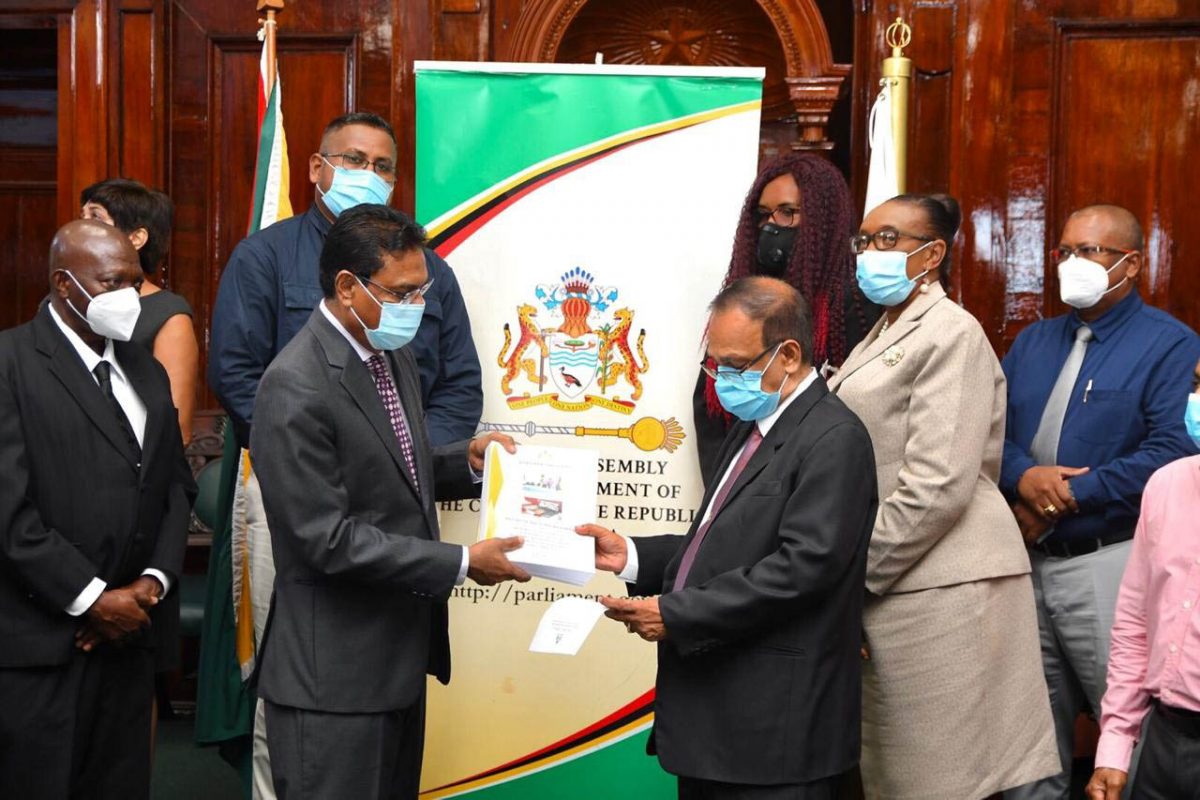Auditor General Deodat Sharma yesterday handed over his report on the public accounts for the fiscal year ended December 31st, 2019 to Speaker of the National Assembly Manzoor Nadir.
It includes findings from three special investigations including for the controversial Ministry of Health drug bond.
Sharma said the report which is the 16th to be presented by him was completed despite a number of challenges faced in light of the protocols in place due to the COVID-19 pandemic.
The report will remain a confidential document until it is tabled at the next sitting of Parliament.
In presenting the report, Sharma noted that it contains findings of three ‘special’ investigations which were finalized during the period of October 2019 and November 2020.
The investigations are the controversial Ministry of Health drug bond at Sussex Street, the Sustainable Livelihood and Entrepreneurial Development (SLED) project and the rehabilitation of the Leguan stelling.
There are three other special investigations. They pertain to the Georgetown Mayor and City Council, the Ministry of Legal Affairs’ Retainers Agreement and the Ministry of the Presidency’s Acquisition of Birth Certificates.
These investigations, Sharma said are at various stages and are yet to be completed.
In addition, he added that in keeping with its mandate, the Audit Office remains committed to continue execution of performance audits.
As such, four performance audits commenced this year but were not completed due to the impact of COVID-19, Sharma said.
These audits focus on the review of the council for Technical and Vocational Education and Training (TVET), preparedness for a marine oil spill, Maternal Health Care Services at the Georgetown Public Hospital Corporation (GPHC) and an assessment of the Hinterland School Feeding Programme.
They are expected to conclude in 2021.
“Performance audit is an important tool for promoting accountability for results and supports the movement by the Government of Guyana to adopt results-based management,” Sharma said.
Meanwhile, during his address, Nadir shared his hopes that sufficient resources can be available so that the number of performance audits conducted per a year can increase.
“If we talk about efficiency, value for money and the best use of the hard earned resources of our land, performance audits are going to be as essential as an annual financial audit of our accounts,” Nadir said.
The Speaker commended Sharma and his staff for completing the 2019 report despite the delay caused by the pandemic.
“With the work that the Audit office has done, with the cooperation of the financial units in the different departments of Government, we move every single year to more transparency and more accountability,” he said.
COVID-19 limitations
According to Sharma, the completion of the report was impacted by a number of limitations which were implemented under the under the Public Health Ordinance.
Among the limitations, he said are the travel restrictions and shift system which were put in place in an effort to prevent the spread of the disease.
Sharma explained that as a result of this, physical verification of projects in Regions 1,7,8,9 and 10 were not undertaken since access to these regions was not possible.
In addition, he said there were limitations in the scope of the audits conducted at Ministries and Departments due to minimal staff on duty.
“(There was) need to prioritize their restricted hours of work and limited physical interactions as mandated by the stipulated COVID-19 protocols which resulted in access to records and documents for audits being inadequate,” he said.
Nevertheless, Sharma stated that although the Audit Office was faced with these challenges, they were able to complete a “substantial” amount of work in order to submit the report.
As the pandemic continues, Sharma stated that the Audit Office is facing “new” and “unique” challenges in performing audits.
“There has never been a time throughout the entire history of our world when the need for Government to move from a manual system and paper-based payments to a computerized system and electronic payments is of equivalent importance to auditors and Government alike,” Sharma said.
“Now, more than ever, the Audit Office has to rely on technology in performing its audits. This makes it more challenging, as we may not be able to physically observe all processes. The requirement to access everything remotely and electronically with limited IT capabilities affected both the Audit Office and its auditee,” he added.





